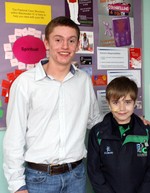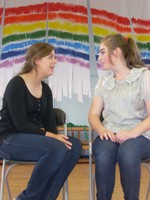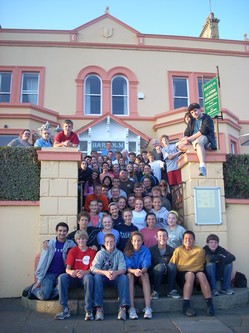The First Presbyterian Church of Dallas Foundation sees growing God’s reign as the cornerstone of its mission.
“What better way to accomplish this than investing in young people?” asks Ellen Masterson, the foundation’s president. “That’s why the foundation makes grants to enable mission trips and other ministry opportunities for youth and young adults, not only in our congregation, but also for the denomination,” she explains. Last year’s grants included funds for a 2012 mission trip to Northern Ireland by the congregation’s youth and a $20,000 contribution to the international component of the Presbyterian Church (U.S.A.)’s Young Adult Volunteer (YAV) program.
These two beneficiaries of the foundation’s generosity came together last summer when the youth mission trip included a visit to the YAV site in Northern Ireland, one of five international YAV sites. After working for several days at Blackwater Integrated College in Downpatrick, the Dallas youth concluded the trip by going to Belfast to hear the YAVs and their site coordinator interpret the situation in the region.
The time at Blackwater enabled the 55 youth and their 20 adult leaders to serve a secondary school that seeks to aid reconciliation in Northern Ireland by educating students from both sides of the region’s political divide. In Belfast, the YAV site visit allowed them to interact with a program that Masterson says “provides life-changing opportunities for young Presbyterians.”
“All of this nurtures the growth our foundation seeks to support,” she notes.
The violence in Northern Ireland has subsided in recent years, but the society is far from integrated. Unionists, who are mostly Protestants wanting to remain part of the United Kingdom, and Nationalists, who are primarily Catholics desiring union with the Republic of Ireland, still struggle to overcome deep divisions Tall metal walls called “peace lines” separate some of their neighborhoods.
Andrew Little, one of the Dallas youth, says the success of Blackwater and other integrated schools are signs that things are changing. However, the situation, particularly in the capital city of Belfast, remains “a work in progress,” he says.
The Dallas youth worked with the Blackwater students on painting, landscaping, and other improvements to the building and grounds. They also studied art and drama together in classes taught by the Dallas group’s adult leaders, and they played soccer and other games.

Andrew Little (left) of First Presbyterian Dallas with Blackwater student Curtis Croskery.
Camilla Ballard, director of youth ministries at First Presbyterian, says the trip was the first venture outside Texas for some of the group. She was surprised how quickly friendships were made and how freely stories were shared.
In the evenings, the Dallas youth would meet in a “home group” and share what they had experienced each day. Ballard says the youth learned much from the Blackwater students about “The Troubles,” a period of violence in Northern Ireland that lasted from the late 1960s until a peace accord was signed in 1998.
“From the first day some amazing connections were made, some over a soccer ball and some during breaks (from classes or work assignments),” Ballard says. While the Blackwater students are too young to remember the Troubles, stories about the turbulent time have been passed down from parents, aunts, uncles and others.
“We spent a lot of time studying the history of the conflict before we went to Northern Ireland, but it was very different hearing about it when we were there,” says Evie Engram, one of the youth from First Presbyterian.
The meeting with YAVs was helpful in understanding the situation, Engram adds. “The Young Adult Volunteers’ passion for this afflicted region was very inspiring.”
The time in Belfast also included a briefing by Doug Baker, the Presbyterian mission co-worker who coordinates the YAV site in Northern Ireland.
When speaking with visiting groups, Baker says he emphasizes that the conflict in Northern Ireland is not a religious one and that it and other struggles around the world are usually more complicated than they are portrayed in media reports. He also tries to get visitors to see that divisions also exist in the United States.

First Presbyterian youth Evie Engram (left) and Blackwater student Rebekah Flynn perform a musical number.
“They find it odd when I tell them that over 50 percent of the population here live in communities that are over 90 percent their own ethnic grouping—until I ask them what the racial residential patterns are like where they come from,” Baker says.
Both Little and Engram say their vistas were broadened because of the trip. “To a much lesser degree will I look at a person and judge whether or not I can relate to them because of the color of their skin or their background,” Little says. “Culture, skin color and ethnicity separate people, but what we have in common far outweighs our differences.”
“The experience definitely expanded my global awareness,” Engram says. “I have a better understanding of how to relate to people in different circumstances from my own.”
The youth trip to Northern Ireland is part of an ongoing relationship that First Presbyterian has had with the YAV program, which is for young people between the ages of 19 and 30 who commit to serve one year in a community of need. In addition to the five international sites, YAVS serve at 11 sites within the United States.
Four members of the congregation have participated in the program in recent years. One of them is now an ordained PC(USA) pastor; one is a discipleship and youth minister at a Canadian church; one is a studying for a doctorate in political science at Notre Dame; and one is an immigration lawyer.
“I think it’s an extraordinary program,” Ballard says. “I don’t know why more young people aren’t clamoring to do it.”
Presbyterian World Mission is seeking to triple participation YAV program between now and 2017. Information about participating in the program or supporting it financially is available at the YAV website.

